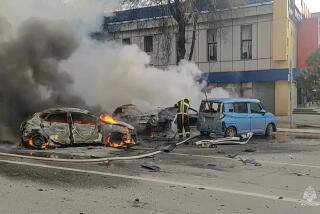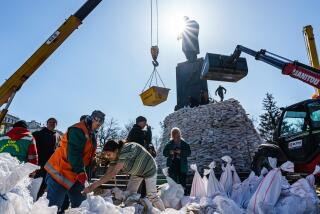Misguided War on Chechnya
- Share via
Three years ago, Russia waged an unpopular war against separatist Chechnya. Once again it’s at war with this tiny Caucasian republic, this time with much broader popular support. To most Russians, Chechnya’s independence wasn’t a cause worth the loss of Russian lives. But the desire for revenge for recent bombings in Moscow and elsewhere, widely blamed on Chechen terrorists, has stirred Moscow to action. Whatever the motivation, Russia’s onslaught in Chechnya will not defeat the defiant population and is likely to get Moscow entangled in a vicious spiral of violence.
Chechen President Aslan Maskhadov, snubbed by Moscow, already is calling on Muslim leaders to summon Chechens to a holy war against Russia, and guerrilla warlords have vowed to take the war to Russian cities.
Moscow’s first campaign of terror against the Chechens claimed an estimated 80,000 lives on both sides and ended in 1996 in de facto independence for Chechnya. President Boris N. Yeltsin, in a rare display of candor, admitted that the war, which galvanized Russian public opinion against him, was a mistake. His then security advisor, Alexander I. Lebed, said “killing hundreds and maiming thousands of people daily” was not the way to secure Russia’s territorial integrity. He predicted “the Chechen war is over for Russia.”
It isn’t. A few weeks ago, bombs again began raining on the Chechens, in retaliation for terrorist strikes in neighboring Dagestan and a series of bombings in Russia that killed almost 300 people. Moscow investigators never established that the bombs were planted by the Chechens, but authorities nevertheless rounded up, imprisoned and reportedly tortured and deported more than 1,500 Chechens living in Russia.
The show of Russian might has drawn broad support, but that’s bound to end if casualties among ill-trained Russian conscripts begin to mount. The ground offensive, which followed weeks of aerial bombing, pushed up to the Terek River, deep in Chechen territory.
Moscow cut off ties with the government of Maskhadov and set up a pro-Russian government. Russian Prime Minister Vladimir V. Putin’s apparent intent is to partition the country of 1 million, using the northern part as a buffer zone. Although Russia can hardly make ends meet and depends on Western loans to keep the economy afloat, Putin is asking the parliament for $1 billion in military appropriation to pay for the war.
Moscow’s fear, that the militant Chechens posed a threat to the stability of the northern Caucasus region, was not unfounded. But the sensible response would have been to reinforce border security and work jointly with Chechnya’s Maskhadov to bring the militants under control. None of the surrounding Muslim regions, including Dagestan and Ingushetia, have secessionist ambitions. But Russia chose to attack Chechen civilians, and more violence is what it will reap.
More to Read
Sign up for Essential California
The most important California stories and recommendations in your inbox every morning.
You may occasionally receive promotional content from the Los Angeles Times.













